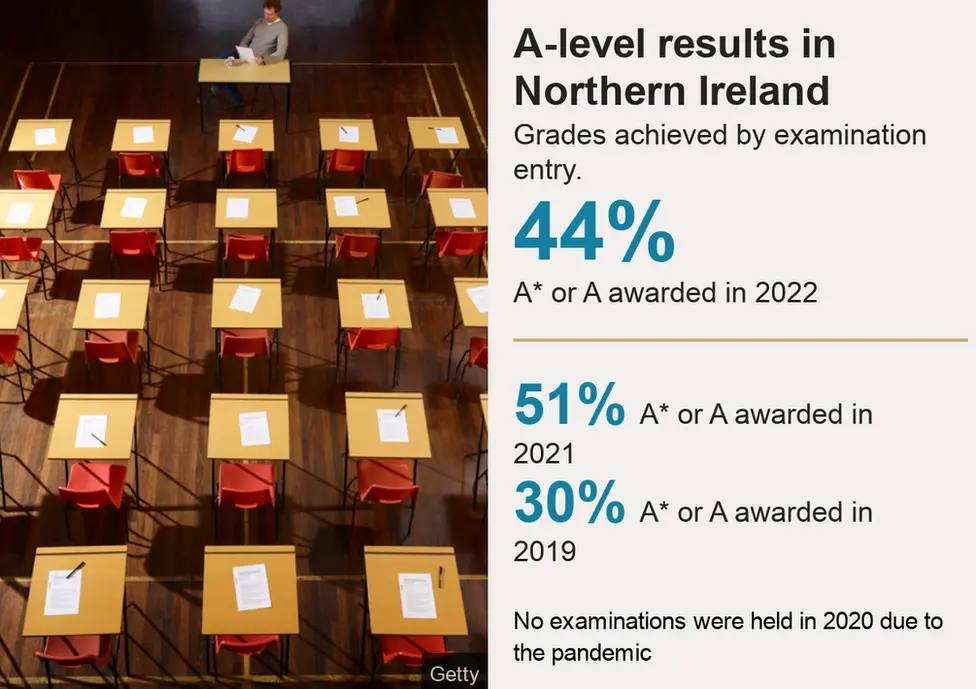A-level results: Number of NI students getting top grades falls
 Brian Lawless/PA
Brian Lawless/PAThere has been a fall in the number of A-level entries in Northern Ireland awarded top A* and A grades in 2022 following the return of exams.
But the proportion of top grades is much higher than in 2019, the previous year when results were based on exams.
About 44% of A-level entries have been awarded A* or A grades in 2022, compared to a record 51% in 2021.
When exams were last held in 2019, just over 30% of entries were awarded A* or A grades.
More than 25,000 pupils across Northern Ireland are finding out their A-level and AS-level results on Thursday.
Their grades are based on the first summer exams held for three years.

A-level and AS-level exams were cancelled in 2020 and 2021 during the Covid-19 pandemic and pupils were awarded grades calculated by their schools instead.
Some students in Northern Ireland are also receiving the results of BTECs or other vocational qualifications.
The vast majority of pupils getting their A-level results will have taken formal summer exams for the first time - as they will not have taken exams at GCSE or AS-level.
 Brian Lawless/PA
Brian Lawless/PAStudents sat fewer exam papers in most subjects in 2022 compared to 2019 and were not tested on some parts of courses to take account of disruption caused by the pandemic.
The Northern Ireland exams board, the Council for the Curriculum, Examinations and Assessment (CCEA), said it expected this year's grades would be higher than the last time exams were held in 2019.
It said grades awarded by examiners will also "take into account the impact of Covid-19".
However, grades will be lower than 2021 when they reached record highs - more than half (51%) of A-level entries were awarded A* or A grades, a rise from about 45% in 2020.
 Pacemaker
PacemakerEducation Minister Michelle McIlveen acknowledged the "significant challenges" faced by students during the last three academic years, which she said made "their achievements all the more remarkable".
"I congratulate all of the young people who have received their A-level and AS-level results today," she said.
"They have worked incredibly hard in their studies and this has been reflected in the grades they have deservedly achieved.
"Despite three years of disrupted learning, our young people have shown immense determination, resilience and tenacity in their studies."
Grades up since before the pandemic
Pupils have been receiving their A-level and AS grades online since 08:00 BST but many are also visiting their schools to collect their results.
The vast majority of AS and A-level entries in Northern Ireland are made through the CCEA.
However, some pupils take some A-levels through English or Welsh exam boards.
CCEA had previously said that A-Level and AS grades would be lower than 2021 but would be higher than before the pandemic to take account of disruption pupils had faced.
That is what has happened.

A-level results: More coverage
- BACKGROUND: How were grades decided?
- WATCH: What to do if you missed your grades
- ANALYSIS: Is university worth it?

Across Northern Ireland, England and Wales as a whole about 36% of A-levels entries received A* or A Grades in 2022.
At AS-level in Northern Ireland, meanwhile, almost 39% of entries received the top A grade, compared to 45% in 2021 and 26% in 2019.
Maths remains the most popular A-level subject overall, although Health and Social Care is the most popular subject for women.
Biology and Chemistry are also among the top five subject choices for women.
Pupils awaiting GCSE results will receive them on Thursday, 25 August.
 Pacemaker
PacemakerRecord number of university applicants
A record proportion of 18-year-olds in Northern Ireland have applied to start university in 2022, according to recent figures from the University and Colleges Admissions Service (UCAS).
More than half (52.8%) of all 18-year-olds in Northern Ireland applied to UCAS by 30 June, up from 52.3% in 2021 and 48.2% in 2020.
That is likely to lead to competition for university places in some popular subjects.
However, there have been calls for more young people to consider vocational or academic qualifications offered through Further Education (FE) Colleges or apprenticeships as an alternative to university.
There has been a significant fall in the number of school leavers entering FE colleges in Northern Ireland in recent years.
CCEA will operate a results helpline from Thursday on 028 9026 1260. There will also be a dedicated 2022 results day area on CCEA's website. The Department for the Economy's careers service is also operating an extended service on Thursday and Friday online or by telephoning 0300 200 7820.